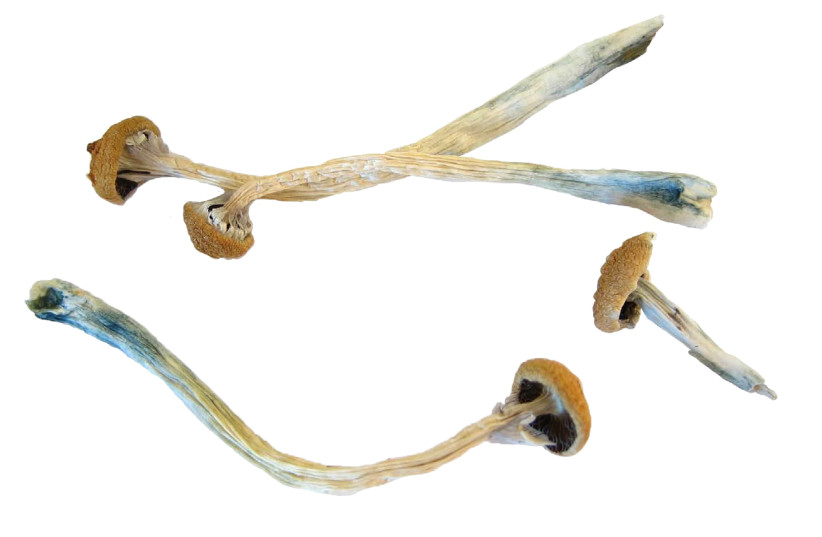Mushrooms help make a great salad or omelet but, amazingly, they may also improve mental health – from depression to post-traumatic stress disorder (PTSD) to schizophrenia – according to a new study conducted at Jerusalem’s Hebrew University-Hadassah Medical Center.
The research, led by doctoral student Orr Shahar and Dr. Alexander Botvinnik, under the guidance of researchers Dr. Tzuri Lifschytz and psychiatrist Prof. Bernard Lerer, indicates that mushroom extract could show superior efficacy compared to chemically synthesized psilocybin, especially in stimulating neuroplasticity and promoting the development of new connections between nerve cells – a vital characteristic.
The research, focusing on synaptic plasticity in adult male mice about 11 weeks old, unveils promising insights into the potential therapeutic benefits of natural psychedelic compounds in coping with psychiatric disorders. Psilocybin-containing mushroom extract, the researchers said, could have a more potent and prolonged impact on synaptic plasticity in comparison to chemically synthesized psilocybin.
Millions of people around the world grapple with psychiatric conditions that remain unresponsive to existing pharmaceutical interventions. Alarming statistics reveal that 40% of people suffering from depression get no relief from currently available drugs. This trend is also observed among those with obsessive-compulsive disorder (OCD).
In addition, with about 0.5% of the population suffering at any given time from schizophrenia, there is an urgent need for innovative solutions suited to those who get no benefit from existing medications. In response to this urgent need, psychedelic drugs are emerging as promising alternatives capable of offering transformative solutions, the team said.

They have just published preliminary findings in the journal Molecular Psychiatry titled, “Effect of chemically synthesized psilocybin and psychedelic mushroom extract on molecular and metabolic profiles in mouse brain.”
Historical uses of the magic mushroom
In ancient medicinal practices, particularly those attributing therapeutic benefits to psychedelic medicine, the use of extracts or entire products, such as eating the entire mushroom, was preferred. Although Western medicine has long recognized the “entourage effect” involved in whole extracts, the significance of this approach has recently gained prominence.
In Western medicine, historically, there has been a preference for isolating active compounds instead of using extracts, mainly for the ability to gain better control over dosages and anticipate known effects during treatment. In the past, the challenge with working with extracts lay in the inability to consistently produce the exact product with a steady compound profile.
Specifically, the research focused on the head-twitch response, synaptic proteins related to neuroplasticity, and metabolomic profiles (using different techniques to isolate and characterize different groups of metabolites) in the frontal cortex of mice.
The results indicate that psilocybin-containing mushroom extract can exert a more potent and prolonged effect on synaptic plasticity when compared to chemically synthesized psilocybin. The extract raised the levels of synaptic proteins associated with neuroplasticity in key brain regions, including the frontal cortex, hippocampus, amygdala, and striatum (the largest structure of the basal ganglia). This suggests that psilocybin-containing mushroom extract may offer unique therapeutic effects that cannot be achieved with psilocybin alone.
Metabolomic analyses also revealed noteworthy differences between psilocybin-containing mushroom extract and chemically synthesized psilocybin; the extract exhibited a distinct metabolic profile linked with oxidative stress and energy production pathways.
These findings open up new possibilities for the therapeutic use of natural psychedelic compounds, providing hope for those who have found little relief in conventional psychiatric treatments, the researchers wrote. As the demand for innovative solutions continues to grow, the exploration of psychedelic drugs represents a crucial avenue for the development of transformative and personalized medicines.
A major challenge with natural extracts lies in achieving a consistently stable compound profile, especially with plants, but mushrooms present a unique case. Mushroom compounds are highly influenced by their growing environment, encompassing factors such as substrate composition, carbon dioxide-to-oxygen ratio, light exposure, temperature, and microbial surroundings. Despite these influences, controlled cultivation allows for the taming of mushrooms, enabling the production of a replicable extract.
This research not only underscores the superiority of extracts with diverse compounds but also highlights the feasibility of incorporating them into Western medicine due to the controlled nature of mushroom cultivation.
